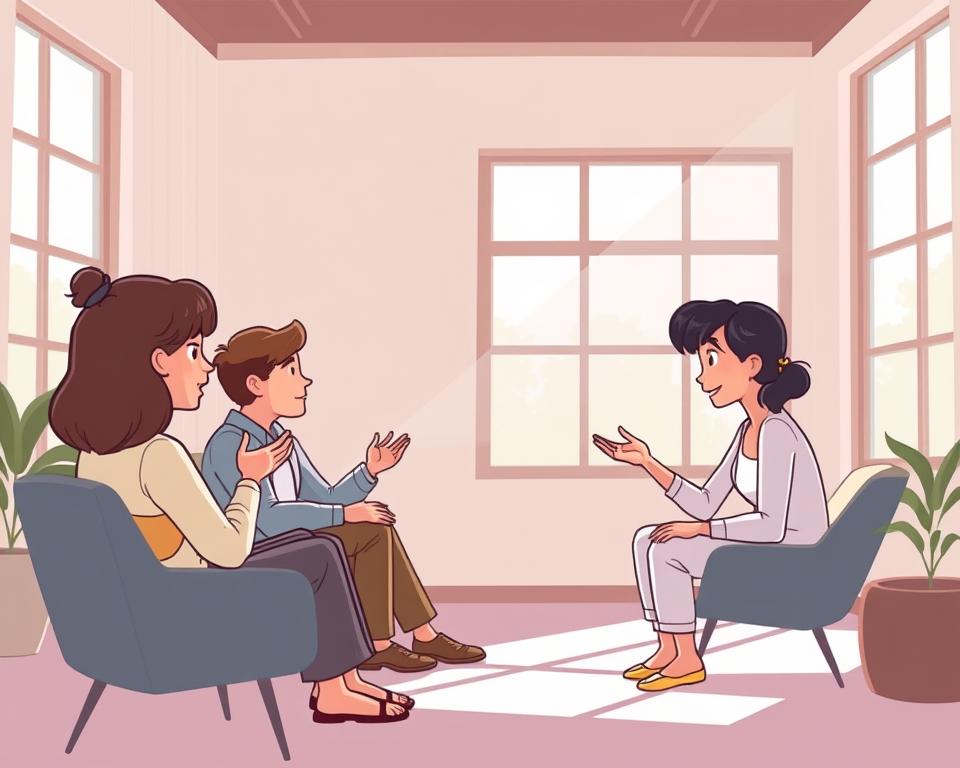Acquire Expert Family & Partner Counseling Aid
Ever thought about the way in which counseling services might transform your relationship for the better? Family-focused and couples therapy functions as a key support. It’s designed to help individuals and their partners as they face the challenges of their relationships. Via professional counseling, families can improve their communication and settle disputes, leading to deeper emotional connections.
In this article, we examine the deep influences of pursuing counseling. It underscores the extensive variety of online mental health therapy offered. It further emphasizes the essential part of proactive marriage therapy in maintaining a healthy relationship.
Grasping Family and Partner Counseling
Family and couples counseling offers a safe setting to address relationship difficulties. It focuses on grasping the patterns and influences on these relationships. Therapists use proven frameworks to devise customized strategies for every family or couple.
Systems modeled on Gottman principles underscore trust, open communication, and heartfelt intimacy. These strategies support couples in navigating conflicts and fortifying their connections. By analyzing these trends, couples can better their exchanges.
Family systems theory is also key. It analyzes how roles within the family and recurring patterns affect relationships. This lens assists families in pinpointing their strengths and spots for growth. Embracing these concepts can lead to more fulfilling connections.

Why Seek Help from a Professional
Pursuing professional guidance presents a variety of advantages for those and families addressing challenges. It provides a safe space for open dialogue, building trust and honesty. Clients receive unbiased viewpoints which assist in untangling deep-seated emotions and social struggles.
The value of counseling extends past short-term solutions. Certified counselors employ proven dispute-resolution tactics, customized to each context. They handle various relational challenges, making certain that each couple and family obtains necessary guidance.
Counseling can significantly boost mental well-being, resulting in more positive interactions and bonds. Evidence points to clients of mental health services having elevated satisfaction and more robust relationship interactions. This highlights the transformative power of professional counseling, showing that seeking help is a vital step towards personal and relational growth.
Available Counseling Services
Multiple types of counseling services are available to address different demands. Marital therapy focuses on guiding couples through enduring challenges. It centers on boosting conversation skills and managing conflicts. Conversely, general relationship counseling is flexible, fitting couples at all phases, from courtship to married life struggles.
Family-centered counseling works to solidify family bonds by confronting complex interrelations. It boosts dialogue and comprehension between relatives. Opting for premarital counseling is another choice, which aids couples in exploring upcoming challenges and syncing principles before marriage.
Solo therapy grants individuals space for self-analysis and progress, adding to marital counseling. Virtual counseling platforms are growing widely used. They expand availability of mental health support, permitting clients to book therapy from their residence.
Determining When to Begin Marital Counseling
Recognizing when to pursue spousal therapy can markedly improve relationship well-being. Symptoms like continuous quarrels, weak communication, and emotional separation commonly hint at the necessity for expert intervention. Such cues indicate that therapy could prove useful.
Significant life transitions may place pressure on a marital relationship. Situations like expanding your family, changing homes, or enduring a profound loss can amplify present stress. Recognizing the proper time for counseling can profoundly determine how you cope with these issues.
Partners facing betrayal, psychological struggles, or addiction frequently consider counseling essential for healing and development. Therapy isn’t solely for emergencies; forward-thinking partners can gain from it too. It nurtures better conversational skills and disagreement-resolution methods, culminating in a more durable bond.
Online vs. In-Person Couples Counseling
The rise of digital couples therapy has revolutionized the way couples access counseling. This approach provides convenience for therapy, aligning with busy contemporary lifestyles. It eliminates the need for travel, making it a favorite among many.
Live, in-office counseling, conversely, brings a singular benefit. It facilitates direct, face-to-face communication between therapists and clients. Numerous individuals feel in-person sessions are more intimate, cultivating a closer bond. This can make discussing sensitive topics easier.
Both methods have their strengths, and selecting one usually depends on individual tastes and situations. Platforms like Talkspace cater to those who prefer online therapy, while traditional therapists offer in-person sessions. Identifying the suitable option is fundamental for attaining relationship milestones.
Exploring Conflict Resolution Strategies
Conflict resolution in therapy is vital for building strong relationships. It’s imperative for partners to boost their conversational abilities and master conflict-resolution. Methods such as active listening and employing “I” statements frequently appear in counseling to foster mutual understanding.
Counselors facilitate structured discussions between partners in therapy. This helps both sides express their feelings without increasing tension. This method enables partners to discover the underlying triggers of disputes. By obtaining emotional clarity, partners can sidestep misinterpretations and lessen animosity gradually.
Practicing these skills in therapy provides a safe space for couples to try out different strategies. As they refine their conflict resolution techniques, they become better at managing disagreements. Such advancement is crucial for a flourishing partnership.
Function of a Certified Therapist
A qualified marriage and family counselor is fundamental in household and partner therapy. They bring deep counseling expertise, guiding individuals through tough relational times. By leveraging specialized instruction, they guide clients in uncovering and resolving problems that influence their relationships.
Counselors endeavor to build a trustworthy setting for frank communication. This environment fosters trust, enabling couples to communicate better and understand each other more deeply.
They also implement personalized coping tactics suited to each family or couple. This tailored model assures that clients obtain the precise aid needed to address difficulties, fostering stronger relationships.
Essential Facts About Marriage Therapy
Marital therapy serves as an essential tool for couples aiming to bolster their connection. It explores fundamental domains such as dialogue, confidence, and emotional closeness. Qualified therapists facilitate couples through planned sessions, assisting them in confronting their problems jointly.
In these appointments, partners discover the core causes of their relationship difficulties. They adopt proven resolution techniques that not only settle present conflicts but also strengthen their relationship long-term. Each session is customized, focusing on the couple’s specific goals and desired outcomes. This customized strategy substantially supports their relationship development.
Spousal therapy provides couples with resources to navigate life’s hurdles. It’s usually considered a cure for immediate troubles, but it additionally functions as preventive care. By committing to these appointments, couples gain richer comprehension and enhance their conversational proficiencies. This cultivates a more peaceful and gratifying relationship.
Finding the Best Counselor
Selecting a counselor is an essential move toward a stronger partnership. Partners ought to initially assess a counselor’s credentials and background. Research is key in this process. You might locate a suitable counselor by browsing internet directories, seeking recommendations, or consulting professional bodies such as the AAMFT.
The therapy approach a counselor uses is critical to success. Counselors might implement cognitive-behavioral therapy, emotional-focused therapy, or various other methods. Understanding these methods helps couples find a counselor whose approach fits their needs, improving their therapy experience.
An introductory session provides a moment to assess compatibility with the counselor. This meeting allows for open discussion of your challenges, creating a space of trust and support. Feeling safe to communicate your opinions and emotions is essential. Allocating time to find the ideal counselor can markedly boost therapy effectiveness.
Real-Life Successes: Effects of Therapy
Counseling has revolutionized the experiences of many, yielding deep impacts. Accounts of therapeutic success create a tapestry of recovery and development. Clients often share their experiences, echoing the hopes of those seeking help. Elevated communication techniques are often cited, allowing couples to convey themselves more effectively.
Partnership testimonials commonly highlight stronger emotional bonds. Partners describe feeling more united and appreciated as a result of therapy. The perks of counseling go past emotional closeness; they provide clients with abilities to address forthcoming disagreements.
| Type of Improvement | Testimonial Illustrations |
|---|---|
| Communication Skills | Partners practiced expressing their needs and wishes plainly |
| Emotional Intimacy | Greater openness fostered stronger bonds |
| Conflict-Handling Skills | Clients noted fewer fights and improved mutual comprehension in conflicts |
Clients regularly demonstrate heartfelt gratitude for the counselor’s assistance, sparking renewed optimism in their relationships. Continuous guidance and subsequent meetings aid in sustaining improvements. Opting for therapeutic support is a smart move for strengthening relationships and encouraging long-term partnership.
Bringing It All Together
Household and partner therapy serves as a crucial tool for anyone wanting to strengthen their bonds. It offers a variety of options, allowing couples and families to receive professional therapy that addresses their specific challenges. This counseling approach creates a secure setting to voice issues, fostering transparent communication and mutual comprehension.
Seeking help from a qualified therapist can resolve immediate conflicts and lay the foundation for long-term relationship growth. Be it via virtual or face-to-face appointments, counseling assists people in delving into their feelings profoundly. This promotes a deeper union between partners.
Accepting therapy is not merely about fixing existing troubles; it’s a preventive measure for a more vibrant, fulfilling future. With commitment and guidance, partners can genuinely flourish as a unit. Their connections can develop constructively, one therapy visit at a time.
